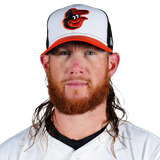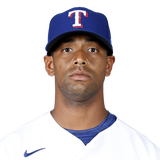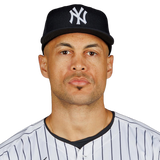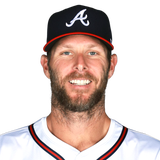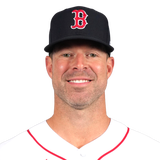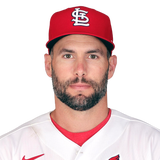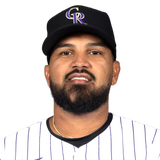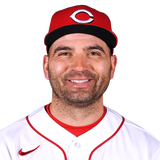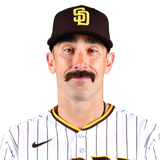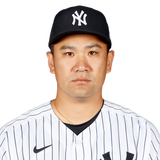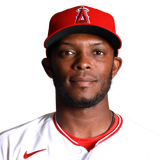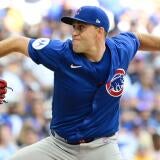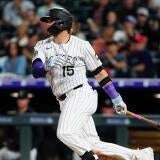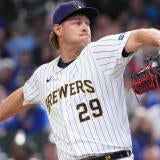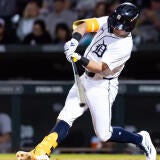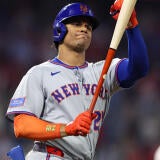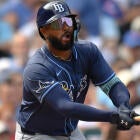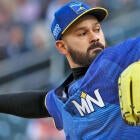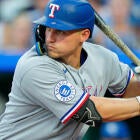2020 Fantasy Baseball Draft Prep: Ranking 17 bounce-back candidates most likely to make an impact
Looking deeper at track records can reveal big potential Fantasy value for players like these 17 who offered less than peak performance in 2019.
I've often said we put too much weight on last year's results in Fantasy drafts. It's only natural, and there's a reason projection systems put more weight on the previous year's performance when trying to predict future performance. But we often go too far in overreacting to one year while ignoring years of data before that when preparing for drafts.
That's where bounce-back candidates come in and can make a real difference. In 2019, Freddie Freeman, Kris Bryant, Jose Altuve, Charlie Blackmon, Luis Castillo, Jonathan Villar and Gary Sanchez all provided lots of value for the Fantasy drafters who were willing to invest in them coming off down years, and they weren't alone.
You can find outright steals on Draft Day by buying players whose stock is down coming off a disappointing season. Here are 17 bounce-back candidates to consider for 2020, ranked by how much confidence you should have in them getting back to their pre-2019 levels:
Judging by the ADP, everyone is already betting on Snell bouncing back, and for good reason. As lucky as he was in 2018 when he led the AL in ERA, Snell was just as unlucky when he stumbled to his 2019 mark. He still got strikeouts at an elite rate, still kept the walks mostly under control and was in the 91st percentile among all pitchers in expected batting average and expected slugging percentage against. There's no reason to think Snell's 2019 was anything more than a bit of bad luck, assuming he doesn't have any more elbow flareups.
| ||||||||||||
The case for a Nola bounce back is a little less clear than it is for Snell, but it's similar — he got a bit luck in 2018 and a bit unlucky in 2019. That oversimplifies things a bit, but Nola's biggest issue was that he was uncharacteristically wild, which put him in more hitter's counts usual. There's nothing in Nola's track record to suggest that will continue to be an issue. Nola has proven he can handle an ace's workload two years in a row and he has a 3.23 ERA over the past three years. He'll be closer to that in 2019.
| ||||||||||||
Syndergaard and Stephen Strasburg were the captains of the "If they just stay healthy" All-Stars. Both stayed healthy, and Strasburg was an ace; Syndergaard led the National League in earned runs allowed. There's no silver bullet as to why Syndergaard struggled in 2019. Sure, he is no longer an elite strikeout pitcher, but he still has elite stuff, including three legitimate swing-and-miss secondary pitches, so it's not exactly a satisfying explanation. Syndergaard is one of the most fastball-heavy starters left in the league, so maybe some tweaks to his approach are in order. Still, Syndergaard had a 3.03 ERA in 2018, so he doesn't have to go far to be a value at his current price.
| ||||||||||||
There's a real easy explanation for why Diaz wasn't good in 2019: He couldn't throw his slider. Oh, he still got plenty of swings and misses with it, but he also gave up six home runs and a .622 slugging percentage with the pitch; he had allowed just five home runs on the slider in his career before that. He attributed the struggles to the lower seam height on the baseball last season, and it's possible that continues to be an issue in 2020. However, Diaz's skill set was largely intact, and home runs are unpredictable from year to year, so it's well worth betting on a bounce back at his reduced price — after all, he was the No. 1 closer this time last year.
| ||||||||||||
Kimbrel might have the best excuse of anyone for his subpar 2019. He remained unsigned until June, almost entirely due to rules regarding draft pick compensation tied to his signing. As soon as that draft pick compensation went away, Kimbrel inked a four-year deal with the Cubs, made four appearances in the minors, and then … promptly struggled in the majors. Maybe he just lost it, but I think missing spring training and then trying to get up to speed in the middle of the season is a bigger part of why he was out of sorts, in addition to the injuries he dealt with. Kimbrel may not be the super-elite closer he was during his heyday, but he still struck out 96 batters in 62.1 innings in 2018 with a 2.74 ERA and 42 saves, so there's significant potential on a competitive Cubs team.
| ||||||||||||
When he suffered a hip injury in early May, Davis was on pace for 48 homers, having clubbed 10 of them in his first 34 games. It would take him 84 games to hit his next 10 homers, and he would hit just 13 more over his final 99 games. It seems like there's a pretty clear cause and effect there. Assuming he's healthy — and we have every reason to believe he is — Davis should be expected to get back to hitting .247 with 40 homers. He has real drawbacks in his game, notably that he is a batting average drain who is only utility or DH-eligible in Fantasy, but with an ADP in the 15th-round range, Davis is an obvious value.
| ||||||||||||
I have no concerns about Stanton's abilities. Ok, maybe he never gets back to being a top-five hitter that he was in 2017, but he was a top-20 hitter in 2018 and still posted elite batted-ball indicators in his small sample size in 2019. If Stanton is healthy, he'll be an excellent hitter, a source of power and run production who stands out even in this inflated offensive environment. Of course, "if he's healthy" is a bigger if for Stanton than for most hitters, especially coming off a season that saw him go on the IL with a biceps strain and a knee sprain before suffering a season-ending quad strain in the playoffs. However, Stanton didn't miss a single game with injury in 2017 or 2018, so we know he's capable of staying healthy. If he does, he's going to give your team a big boost.
| ||||||||||||
I have a few more concerns about Sale's viability than Stanton's because he did show signs of slipping even before suffering a season-ending elbow injury — the second straight year he has been limited to fewer than 160 innings. His velocity was notably down early in the season, and while it rebounded a bit, Sale never got back to his 2017 or 2018 velocity levels. And, while he was able to rack up strikeouts at a near league-leading pace yet again, his average exit velocity allowed jumped to 88.1 mph, the highest of his career in the Statcast era; his expected wOBA on contact similarly jumped to .407, up from his career .372 mark and the worst of his career. It wasn't just bad luck, Sale got rocked too often to chalk it up to that. However, if he's healthy, you should still get a low-3.00s ERA and a ton of strikeouts from Sale — he has struck out at least 208 in seven straight seasons. One concern is, it's not clear if he'll be ready by Opening Day after dealing with pneumonia early in the spring.
| ||||||||||||
There are more questions about Kluber's viability than either Sale's or Stanton's, and for good reason: He made just seven mostly bad starts before going on the shelf for good with a pair of arm injuries and is about to turn 34. It's not quite as bad as all that makes it sound — Kluber averaged 92.3 mph with his fastball in April, up from 2018 and right in line with where he had been in 2016 and 2017, and the injury he suffered came as a result of a line drive comebacker, not a structural issue. And, for as bad as Kluber was before the injury, it wasn't that much worse than his first six starts in 2017 before he went on the IL — he would famously go on to win his second Cy Young award upon his return. There are good reasons to be skeptical of Kluber, but I'm not as convinced as many in the industry are that he's just finished as a high-end pitcher.
| ||||||||||||
For the second straight season, Goldschmidt had to get hot to pull out of a slow start. However, in 2018, Goldschmidt put up a 1.023 OPS over his final 110 games to get his final numbers pretty close to where we expected them, he couldn't make up for the slumps this time around. He had an .886 OPS in the second half, which would have been his lowest OPS for a season since 2012. Goldschmidt was still a good hitter, of course, but we're starting to see potential signs of a decline in underlying skills — he posted a career-high swing rate, including on pitches outside of the strike zone, despite the fact that opposing pitchers weren't throwing him stuff in the zone more often than usual. Add in his lowest average exit velocity and hard-hit rates of the Statcast era, and it all looks like a guy who has lost some bat speed. It all still mostly points to a well above average hitter — perhaps even one who got a bit unlucky last season — but probably one who won't return to his formerly elite levels. And could be in true decline.
| ||||||||||||
There were still solid skills there for Hoskins, who led the NL in walks and hit 29 homers even in what was overall a pretty disastrous season. However, there were also real signs that his swing was just broken, most notably with a sky-high popup rate and a .221 expected batting average per Statcast stats that shows it was no fluke. The question is whether Hoskins can fix his swing to tap into more of the power and avoid all of that weak, unproductive contact. He came to spring with a new batting stance with the hopes of alleviating some of those concerns, but we'll need to see it in action before determining whether it will work. There's upside for 40 homers here, but he. Needs to improve dramatically to get there.
| ||||||||||||
Every time we try to convince ourselves there is a pitcher who can overcome Coors Field, it ends up biting us. Marquez took a significant step back across the board in 2019, and it wasn't just because of Coors, however. His slider and curveball were both less effective than they had been in 2018, and he seemingly tried to counteract some issues keeping the ball in the yard by throwing his sinker more — despite the fact that it has been less effective than his four-seamer both seasons. There's no one magic bullet to fixing what went wrong for Marquez in 2019, and the fact that he still plays half his games at Coors means the margin for error is slim. I still think he's a decent value at his current 16th-round ADP, but you might only be able to trust him on the road.
| ||||||||||||
There really isn't very much promise in the underlying numbers for Votto, whose strikeout and walk rates both moved in the wrong direction without a concurrent improvement on batted balls to make up for it. Votto has been defying typical aging curves for a long time, but even he may not be able to tinker his way out of the inevitable decline.
| ||||||||||||
Carpenter is in a similar spot to Votto, where the underlying numbers just don't suggest much room for optimism. However, at least in his case, Carpenter did have a truly elite 2018 performance, whereas Votto has to go back to 2017 to find something to truly inspire optimism. It wouldn't shock me to see Carpenter bounce back to pre-2018 levels, and the price is cheap enough that it could be worth taking a flier.
| ||||||||||||
Tanaka is in a similar boat to Edwin Diaz, where the lower seams on the baseball in 2019 messed with his ability to throw his signature pitch. In Tanaka's case, it was the splitter that was affected, and he spent most of the season trying to find a grip that would return the pitch to its previous glories. The problem is, Tanaka had a 4.28 ERA in the previous two seasons before 2019, so it's not clear how much upside is there even if he does figure out the right grip.
| ||||||||||||
I'm probably more optimistic about Upton's chances than anyone in this group. He suffered a toe injury right before the season and just never seemed right, so it seems fair to give him a pass for that. He still hit the ball pretty hard, so it's not like there was a total skills collapse. If he makes it through spring training healthy, Upton makes for a pretty strong bounceback, though it's fair to wonder if the days of him stealing even 10 bases might be done.
| ||||||||||||
Myers has shockingly managed to play 155 games in three of the past four seasons, but it doesn't quite feel like that because he struggled with injuries in 2018 and then wasn't a full-time player in a crowded Padres outfield in 2019. That outfield is significantly less crowded now than it was this time last year, though it still doesn't look like he will be an everyday player to start the season, with Tommy Pham and Trent Grisham likely holding down left and center field. However, Myers is still averaging 22 homers and 19 steals with a .249 average over the last four seasons despite missing time, so if he's anything close to a full-time player, Myers is going to be a starting-caliber outfielder in 5x5 leagues. The key might be the Padres finding a taker for his contract before the season starts.
| ||||||||||||
So which sleepers should you snatch in your draft? And which undervalued first baseman can help you win a championship? Visit SportsLine now to get rankings for every single position, all from the model that called Kenta Maeda's huge breakout last season, and find out.









